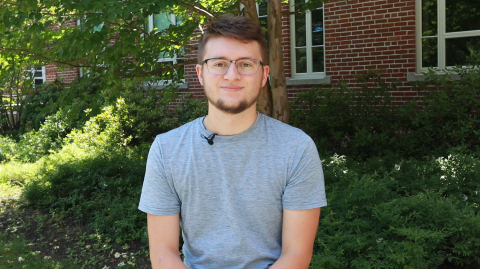
Paul Pollaro graduated this spring with a degree in Sustainable Agriculture and Food Systems. During his time at UNH, he fused his passion for plants and interest in history by researching silphium, an ancient herb loved by the Greeks and Romans until its extinction.
Paul and faculty research advisor Professor Paul Robertson’s findings contradicted the standing belief that silphium’s extinction was due to overconsumption with evidence that the herb may have actually been wiped out by climate change. These findings resulted in a published paper that was later covered by British daily newspaper The Guardian, kicking up a subsequent buzz on social media.
Now that he’s earned his degree, Paul will be starting his career in product development at Maine Grains.
Paul Pollaro: Having lived in New Hampshire nearly my entire life, UNH was a fitting choice, both financially and logistically. During my later years at UNH, I have come to appreciate the campus and developed close relationships with some of my professors.
Paul: My decision to major in Sustainable Agriculture and Food Systems was undoubtedly rooted in my person interest in food and gardening (a hobby that I developed at a very young age). During my time in college, these interests evolved into a specialization in food history and culinary extinctions.
Paul:My primary accomplishment during my time at UNH is undoubtedly the publication of my first research article, written alongside Dr. Paul Robertson. Our research explored the causes of the first recorded species extinction, an ancient herb known to the Romans as silphium. The conclusions of our research may have finally solved this ancient cold case and would mark silphium as the first recorded instance of species extinction due to human-induced climate change.
"The conclusions of our research may have finally solved this ancient cold case and would mark silphium as the first recorded instance of species extinction due to human-induced climate change."
Paul:Following graduation, I will be continuing my work in the field of food history and the preservation of endangered food crops. I am currently the gardener and historical researcher for the Heritage Harvest Project, which is focused on the preservation of regional heritage foods in New England.
Paul:I will also soon be joining the team at Maine Grains, working primarily on product development. This will include researching heritage grain crops and developing recipes to highlight their unique flavors and qualities.
Paul:The relationships that I have developed with faculty at UNH have been (and will continue to be) the most valuable result of my time at UNH.
Paul:The campus is undoubtedly my favorite aspect of UNH and will be what I miss most. If the university were to offer a graduate program of interest (perhaps Anthropology or Archaeobotany) at any point in the future, I would return in a heartbeat. Teaching one of those topics at UNH one day would be a dream.
Paul:I ran the Vermont City Marathon barefoot (just for laughs).